 MyCatBreeds
MyCatBreeds Norwegian Forest Cat is originated from Norway but Exotic Shorthair is originated from United States. Both Norwegian Forest Cat and Exotic Shorthair are having almost same weight. Both Norwegian Forest Cat and Exotic Shorthair has almost same life span. Both Norwegian Forest Cat and Exotic Shorthair has same litter size. Norwegian Forest Cat requires Moderate maintenance. But Exotic Shorthair requires Low maintenance
Norwegian Forest Cat is originated from Norway but Exotic Shorthair is originated from United States. Both Norwegian Forest Cat and Exotic Shorthair are having almost same weight. Both Norwegian Forest Cat and Exotic Shorthair has almost same life span. Both Norwegian Forest Cat and Exotic Shorthair has same litter size. Norwegian Forest Cat requires Moderate maintenance. But Exotic Shorthair requires Low maintenance
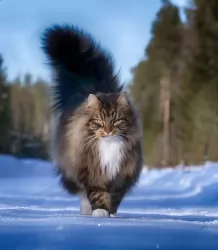 The beautiful Norwegian Forest cat has a thick fur to survive the snow and icy weather in Norway. It is the official cat of Norway.
The beautiful Norwegian Forest cat has a thick fur to survive the snow and icy weather in Norway. It is the official cat of Norway.
It originated in Northern Europe. It is believed that the cat was brought to Norway from Great Britain way back in the time of the Vikings. It is also believed that it reproduced with farm cats and has become the modern-day Norwegian Forest breed.
They were discovered in the early twentieth century by cat enthusiasts and in 1938 an organization was established devoted to this breed.
Also, a club was started for the cat in Oslo so as to preserve the breed. The 2nd World War saw the cat all but disappear but a breeding program was started. It was registered in Europe by the 1970s, and in 1994 by the American Cat Fanciers Association and others.
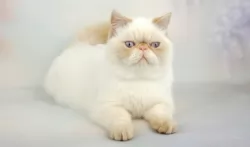 The Exotic Shorthair cat is such a sweet-faced cat that it is often referred to as the ‘lazy man’s Persian. This is because the face is also flat and pushed in like the Persian cat.
The Exotic Shorthair cat is such a sweet-faced cat that it is often referred to as the ‘lazy man’s Persian. This is because the face is also flat and pushed in like the Persian cat.
The Exotic Shorthair was in fact developed as a short-haired version of the Persian. It was in the 1950s that the Persian was used to mate with other breeds such as the Burmese.
The crossbreed gained recognition but some American Shorthair breeders produced a new breed standard that would disqualify American Shorthairs that showed any signs of crossbreeding.
It was in 1966 that the Cat Fanciers Association recognized the cat as a new breed and under the name Exotic Shorthair.
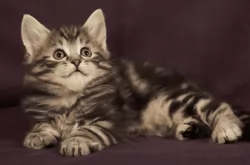 This domestic cat is a natural breed with a thick coat of long water-resistant fur and a woolly undercoat. The coat can be in many colors and patterns.
This domestic cat is a natural breed with a thick coat of long water-resistant fur and a woolly undercoat. The coat can be in many colors and patterns.
This is a big, strong, heavy boned cat with a bushy tail and long legs. It’s larger than your regular cat and can weigh anything between 3 and 9kg. The eyes are almond-shaped and can be any color while the large ears are high set.
In spite of this being a large cat, they are energetic and yet they don’t like being around boisterous, energetic pets. They are friendly, calm, gentle, and intelligent and enjoy being part of a human family.
They tend to be a bit reserved around strangers. It’s not a demanding cat and can entertain himself with his toys.
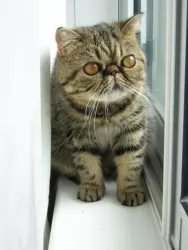 Developed through crosses between Persians and American Shorthairs as well as other cat breeds, the Exotic Shorthair looks like the Persian but he has a short coat.
Developed through crosses between Persians and American Shorthairs as well as other cat breeds, the Exotic Shorthair looks like the Persian but he has a short coat.
The coat is found in the same colors as the Persian cat – patterns and solid colors, ranging from chinchilla silver to tabby, tortoiseshell, black and white and bicolor. The eyes are large and round, the ears small and round and the tail fairly short and thick.
The Exotic Shorthair is a sweet, gentle, calm cat but a bit livelier than the Persian. They’re lively, friendly, and playful, but are also cats that like to sit in your lap and be stroked.
They get on well with children and other pets, being a loyal friend to the entire family. He quietly communicates with his human family with a soft voice. He is also quite adaptable to living conditions so long as his human family provides him with lots of attention.
He won’t want to be left for long periods of time on his own so he won’t suit living in a home where he is left alone all day.
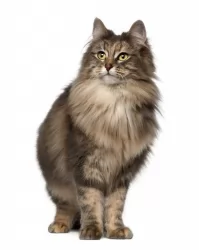 Remember that your large Norwegian Forest cat likes to scratch so you want to provide him with a scratching post. He is so companionable, you want to reward him by ensuring you make his life as easy as possible.
Remember that your large Norwegian Forest cat likes to scratch so you want to provide him with a scratching post. He is so companionable, you want to reward him by ensuring you make his life as easy as possible.
Known as a gentle giant, the beautiful and undemanding Norwegian Forest cat will appreciate a calm household where he can quietly enjoy the companionship of the humans he loves.
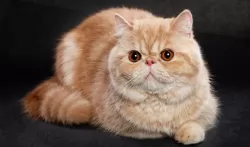 Your Exotic Shorthair is a loving cat and for those who prefer, it is a cat that is livelier than the Persian. While the Exotic Shorthair also has a mellow personality, because of its shorthair ancestors, it's more active.
Your Exotic Shorthair is a loving cat and for those who prefer, it is a cat that is livelier than the Persian. While the Exotic Shorthair also has a mellow personality, because of its shorthair ancestors, it's more active.
This Exotic cat can live to be 15, 16, or 17 if you care for him well and that means you have 15 years to share with a most wonderful feline companion.
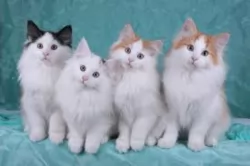 The lifespan of this big, longhaired cat is usually 14 to 16 years, but you need to check out kidney and heart disease with this particular breed as well as patellar luxation.
The lifespan of this big, longhaired cat is usually 14 to 16 years, but you need to check out kidney and heart disease with this particular breed as well as patellar luxation.
You don’t want your cat having problems with the knee cap as this takes away from his ability to leap, pounce and crouch. It’s when the patella or kneecap is out of place. There may not necessarily be pain for your pet and in fact, your cat may not show any signs of abnormality till the condition has become quite advanced.
Your cat can actually become lame. You want to avoid this with the Norwegian as it's a particularly good climber.
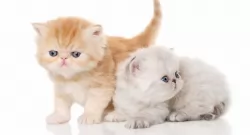 With the Exotic Shorthair, some of the diseases are genetic while others can be encouraged by poor diet and lifestyle.
With the Exotic Shorthair, some of the diseases are genetic while others can be encouraged by poor diet and lifestyle.
Obesity for instance is a major disease of cats and it contributes to many serious illnesses in cats. Excess weight shortens your cat’s life and contributes to arthritis and diabetes. The extra weight puts a strain on the cat's joints. Shedding just a little bit of weight can result in improved mobility.
Dental disease is a common chronic problem in pets. Make sure to check inside your cat’s mouth from time to time as serious dental problems can cause pain and interfere with the health of your cat’s important organs such as heart and kidneys.
All kinds of parasites can invade your Exotic Shorthair's body, internally and externally – worms, fleas, and ticks - and cause your pet a tremendous amount of pain and discomfort.
Brachycephalic Syndrome is a respiratory distress syndrome and it mostly affects what is known as brachycephalic cats – those cat with snub faces like the Exotic Shorthair.
The flattened features of the face make it that there is less space for the tissue to grow. The soft area at the back of the roof of the mouth hangs into the airway, obstructing it, and they can’t breathe normally. Sometimes the cats will require surgery to allow for more regular breathing.
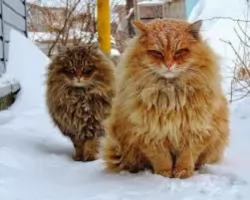 The Norwegian has a long coat so you will need to brush it at least twice a week to keep it nice and shiny and free from tangles.
The Norwegian has a long coat so you will need to brush it at least twice a week to keep it nice and shiny and free from tangles.
Trim your Norwegian forest cat’s claws. You will need a special nail clipper, but if you're nervous to cut the nails yourself, your vet or pet groomers can do it for you.
Cats battle quite a bit with periodontal disease and an excellent diet can help to prevent this. Cats hate you sticking a toothbrush into their mouths – they can become terrified - and it would b kinder to simply have your cat’s teeth checked out at the vet when you suspect that something might be wrong. At the same time, you can ask to have the inside of your cat’s ears checked for dirt and infection.
Keep your cat’s litter box spotlessly clean. These cats dislike a dirty litter box intensely. Remove all feces every single day – more often even if possible.
One good way to select the best food for your cat is to read the ingredients. The first two ingredients listed on the package should always be meat. Select a high-quality cat food. Keeping Norwegian Forest cats in good health requires high-quality cat food to meet all of your Norwegian forest cat’s nutritional needs.
You can feed your Norwegian Forest cat two meals per day. Always check with your veterinarian for a recommendation on how much and what to feed your cat.
Provide a constant supply of fresh, clean water for your Norwegian Forest cat.The bowl should be in an easy place for your cat to reach and in the shade.
Provide your Norwegian with a soft bed in a quiet, restful place.
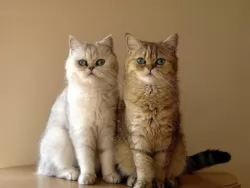 It is important to understand the type of foods available to your pet and how often and how much to feed him.
It is important to understand the type of foods available to your pet and how often and how much to feed him.
Most cats prefer to eat several small meals a day as opposed to a couple of large ones. Make feed times interesting and provide food puzzles to have your cat ‘prey’ for food.
Always read and understand the labels on the cat food packaging and be sure to always feed your Exotic Shorthair with the very best food there is and to follow the portion guides.
If you’re in any doubt or your cat doesn’t want to eat his food, try something else or speak to your vet about how to be sure your cat is getting fed the best food there is.
Make sure to have your kitten vaccinated as required. Also, when you take your kitten in to be vaccinated, the vet will also perform a check-up to make sure your kitten is healthy as these cats are susceptible to bacterial and viral infections.
Your cat has a short, low maintenance coat. A brush once a week can get rid of loose hairs and you and your cat will both enjoy the therapeutic bonding between the two of you.
Check your cat’s inner ears for wax and debris as well as for signs of any infection, and if you don’t want to do that, professional cat groomers can do it for you.